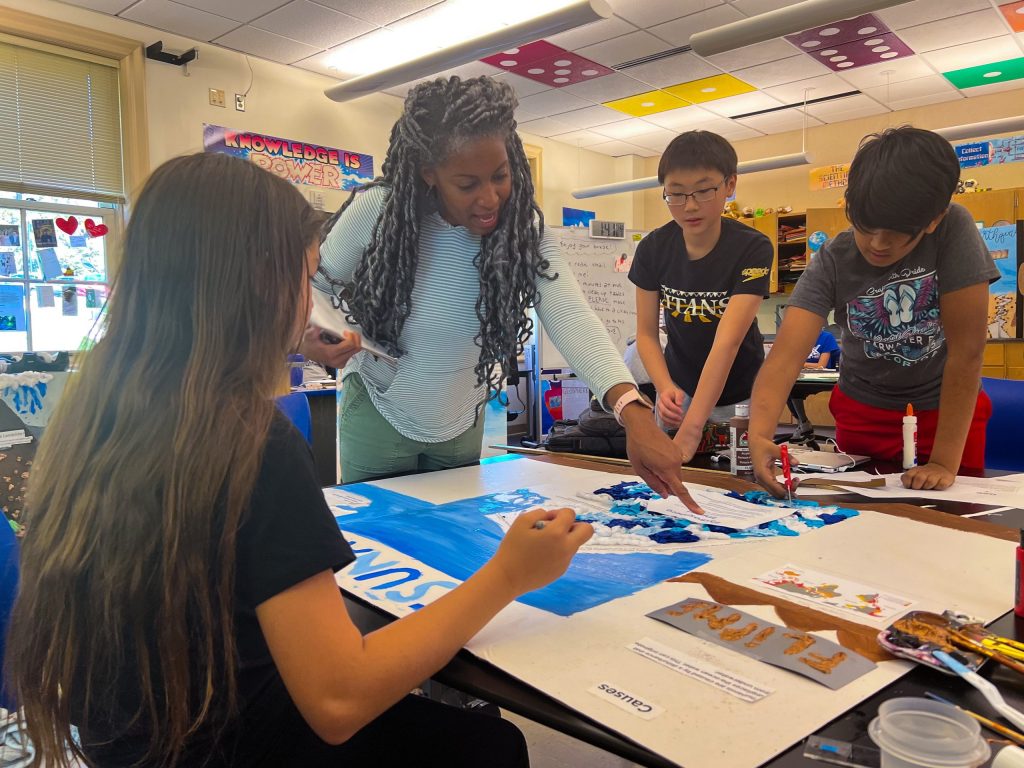Have you ever wondered what our teachers are up to during their summer breaks? Each year, many CA faculty spend their well-deserved summer vacation on professional development opportunities that translate their interests into incredible learning opportunities for our students—in the classroom and beyond.
Cary Academy offers two major grant programs to support the professional development of our faculty during the summer months: the Friday Fellowship and the Innovative Curriculum Grant.
So, what exactly did our tireless teachers work on this summer through these grant programs?
Kendall Bell, Heidi Maloy, and Charlotte Kelly, Upper School science teachers, received a collaborative fellowship to interweave DEI work into the chemistry curriculum, incorporating a broader range of scientific, cultural, and professional examples of who contributes to our understanding of chemical concepts, with the goal of giving all students the opportunity to see themselves doing chemistry.
Lauren Bullock, Middle School language arts and social studies teacher, received fellowship funding to participate in the Kundiman summer retreat for Asian American writers. Participation in the retreat not only helped to sharpen Lauren’s own skills as a writer, but also enabled Lauren to foster connections to the writing world as the language arts team searches for more diverse voices to add to the Cary Academy literary canon and even invite onto campus.
Tamara Friend and Danae Shipp, Middle School science teachers, received a collaborative fellowship to research and develop a plan for creating a dedicated STEM space in the Middle School building. Tamara and Danae attended the 2023 ISTE (International Society for Technology in Education) conference with a focus on sessions and exhibitions related to Makerspace development, and also conducted site visits to local schools and public libraries with Makerspaces. They used the information they gathered to produce a layout and equipment acquisition plan for a pilot STEM space to be housed in a first-floor science classroom, with the goal of having the space outfitted and ready to use late in the first semester or early in the second semester of the 2023-24 school year.
David Kaufmann, Middle School math teacher, received a fellowship to participate in the 2023 ISTE (International Society for Technology in Education) conference to learn more about supporting student learning through gamification, coding, and technology-enhanced projects that encourage both application and creative expression. David used the conference experience to design three new digital projects for his math classes.
Ty van de Zande, digital arts and coding teacher, received fellowship funding to undertake a visualization project using hand-made glass objects to model fundamental concepts and principles of computer science. Ty produced a set of models built from glass, photos of the glass models, photo documentation of the building process, and a write-up describing the models and how they represent the fundamental processes. Through the photography process, the glass models can be combined and arranged with other glass models to represent a real computer code program.
Crystal Bozeman, Middle School learning specialist, and Katie Taylor, Middle School language arts teacher, received a collaborative grant to create a “Leaders in Literacy” program to support Middle School students in developing their literacy skills, especially reading and writing. The new program focuses on teaching the science of reading and writing and strategies that will work across texts, emphasizing hands-on activities that give students active and engaging ways to build their literacy skills.
Kara Caccuitto, Upper School English teacher, received grant funding to develop a new English elective for juniors and seniors on Magical Realism. The majority of anchor texts in the new course are of Latin American origin, giving students a chance to explore the art, history, and culture of this part of the world. Students also have ample opportunities to demonstrate their understanding of the characteristics of magical realism through a variety of creative self-expression activities, including producing a podcast, compiling an electronic cookbook, and developing a poetry or song anthology.
Sam Krieg, Upper School Spanish teacher, received a grant to develop a new Spanish elective focused on Spanish for business use. The course provides opportunities for students to communicate with professionals from throughout the Spanish-speaking world representing a range of commercial endeavors, including hospitality, banking, agriculture, and education. Students also have the chance to learn about, and reflect on, the (in)equalities of business relationships at different levels and to explore the essential roles of immigrants in different commercial contexts.
Kristi Ramey, Upper School math teacher, received grant funding to create a new model for Calculus 1 that expands access to the course content by creating both a regular and an advanced pathway within the same class. Kristi’s work focused on creating appropriately differentiated assignments and assessments to meet the needs of both groups of students, as well as appropriate supplemental materials for those students opting to pursue the AP exam.
Erick Crepsac, Middle School math teacher, was selected to participate in the Teachers Across Borders Program in Southern Africa (TAB-SA). Erick was part of a team of American math and science teachers who traveled to South Africa during the summer to conduct curriculum-specific workshops with their South African colleagues from rural schools, sharing methodology, techniques, and pedagogy in STEM content areas.

